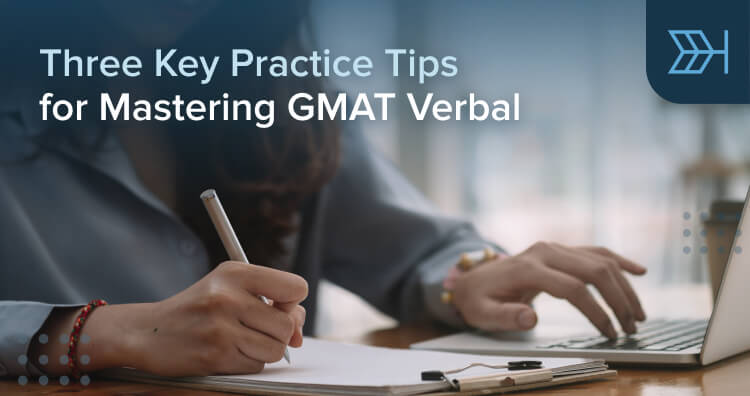
Three Key Practice Tips for Mastering GMAT Verbal
In the quest for stellar GMAT scores to report to business schools, people diligently prepare for both the quant section and the verbal section of the GMAT, learning a multitude of concepts and then practicing hard. However, while most GMAT students see significant results from the quant side of their test prep, many are left wondering why they haven’t gotten similar results in verbal. So, what is it about GMAT verbal that leads to this difference in results, and what can GMAT students do to achieve their desired verbal scores?
The answer to these questions lies in part in what the verbal section of the GMAT tests. According to the website of the Graduate Management Admission Council (GMAC), “The Verbal Reasoning section of the GMAT™ exam measures your ability to read and comprehend written material, reason and evaluate arguments, and correct material to express ideas effectively in standard written English.”
Notice that the above description of the verbal section of the GMAT mentions skills such as reading, comprehending, reasoning, and evaluating. So, what we can gather from that description is that the verbal section of the GMAT tests skill.
That information is key, because developing skill takes practice. So, what that information indicates is that practice is a key aspect of GMAT verbal success. And in fact, the most common reason why people preparing for GMAT verbal can learn about all kinds of concepts and question types and diligently prepare without getting the results they want is that their GMAT verbal prep is missing one key ingredient: effective practice.
So, without further ado, let’s discuss three key tips that you can apply when doing GMAT verbal reasoning practice so that you master GMAT verbal and achieve your verbal score goal.
Tip #1: To Develop Strong GMAT Verbal Skills, Do Most of Your Practice Untimed
My first, and possibly most important, tip for anyone seeking to develop the kind of strong GMAT verbal skills that result in a high verbal section score is to do most of your verbal practice untimed. In fact, whenever someone contacts me wondering why he or she isn’t seeing improvement in his or her verbal score, one of my first questions is “How much time do you typically spend on each practice question?” If the answer is that the person has been setting a timer and answering practice questions in under two minutes each, I know we’ve found one key thing that person can do to get better results: turn off the timer and take as much time as needed to fully understand each question and arrive at a correct answer.
Now, you might be surprised by, or even skeptical about, this tip because you’re aware that the verbal reasoning section of the GMAT gives you 65 minutes to answer 36 questions, or about 1:48 on average for each question. If so, you’re certainly not alone. Many people have the impression that the best way to prepare to answer GMAT questions at test pace is to replicate that pace when practicing. However, the truth is that untimed practice actually works much better than timed practice for developing the ability to correctly answer verbal questions in 1:48 each, and here’s why.
The reason why you’ll be able to correctly answer a tricky GMAT Sentence Correction, Critical Reasoning, or Reading Comprehension question in under two minutes on test day won’t be that you’ve raced through hundreds of practice questions. The reason will be that you’re so skilled that you can readily answer a verbal question in that amount of time, and the best way to develop that level of skill is to practice untimed. After all, when you take the time necessary for fully analyzing a question, noticing key details, and carefully using logic to arrive at a correct answer, you give yourself the time you need to develop your skills.
So, when you’re answering verbal practice questions, take all the time you need for carefully reading the passage, analyzing the underlined part of a sentence, evaluating the argument, or doing whatever else you need to do in order to get the questions correct. In other words, shoot for full understanding and high accuracy, regardless of whether you have to spend 5, 20, or 30 minutes on a question to do so.
Sure, when you’re close to test day, you can push yourself to answer verbal practice questions at test pace. Also, you’ll answer verbal questions at test pace when you take GMAT practice tests. However, for most of your verbal GMAT prep, practice untimed.
Tip #2: When Practicing GMAT Verbal, Treat Every Answer Choice as a Question
This next tip involves the following key difference between GMAT quant questions and GMAT verbal questions. In most cases, when you answer a quant question, you’re concerned with only one of the five answer choices, the correct answer. On the other hand, when you answer a verbal question, you have to consider all five answer choices to eliminate four of them and choose one.
What this difference means is that, for best results, you should practice answering verbal questions differently from how you practice answering quant questions. Specifically, it means that, when you’re training for the GMAT, you should treat every verbal answer choice as a question to be completely understood and answered.
To read the full article, please visit Target Test Prep's blog.



















